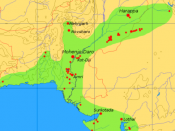Hinduism
Paul Foster
Axia College of Univ. of Phoenix
Hum 130: Religions of the World
Darrel Justh
May 18, 2008
After Christianity and Islam, Hinduism has becomes the third largest religion in the world, and is regarded as the world's oldest organized religion. Hinduism is a group of developing practices and beliefs. "Hinduism has its roots in the interrelationship of two basic religious systems: that of the ancient civilization residing in the Indus River Valley from the third millennium B.C., and the religious beliefs brought to India by the Aryan people (possibly from the Baltic region) who began infiltrating the Indus Valley sometime after 2000 B.C. (Rood, 1994)"
There is a very large controversy that still lingers over the historical origins of Hinduism. At one point and time it was believed that Hinduism was discovered by the arrival of the Aryan people in India, as mentioned above, around 1500 B.C.
The Harappan culture in the Indus Valley, which were people described in Hinduism's sacred literature "the Vedas", was replaced by the migration of the Aryans. On the other hand, based on archaeology it has been disputed that there were discovery sites in western and northwestern India. So by these two claims or findings, there is no clear answer as to where Hinduism was originated.
It is claimed that 13% of the world is made up of Hinduism followers, which is roughly 837 million people. In Nepal, India, and few in Sri Lanka, Hinduism is the dominant religion. Many forms of Hinduism are religions that worship a particular God without disbelieving in the existence of others. They believe in one Supreme Being, and envision other beings as manifestations of that one Supreme Being.
Since there is not a uniting belief system with Hinduism, there are general beliefs and traditions that contribute...


